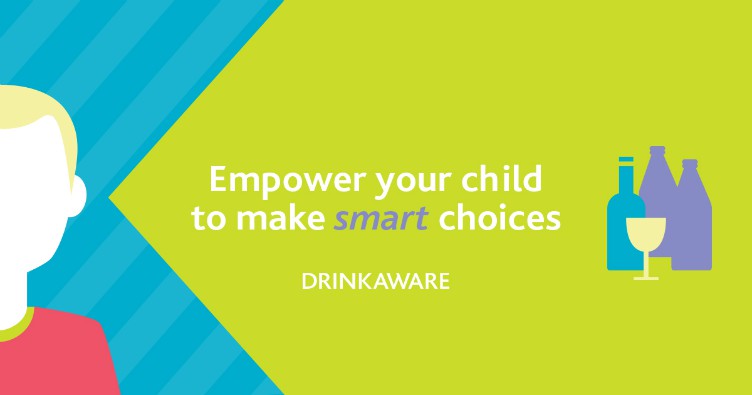Why does talking to your teen about alcohol matter? Research confirms the role of the family and parents as the most important influence on children’s expectations, attitudes, and up to a certain age, behaviours relating to alcohol use.1 Even at an early age, children develop a sophisticated understanding of alcohol and its effects from observing parents and other adult relatives.2 Young people absorb parental behaviour and attitudes in the home, the place where parents spend most time relaxing, socialising and even before Covid-19, drinking, (62% of all drinking, taking place in the home).3 At home drinking can have a significant negative effect on adolescent children while hazardous drinking at home can increase the risk of children engaging in hazardous drinking and experiencing alcohol-related harm.
Alcohol expectancies refer to the beliefs about the effects of consuming alcohol and have been shown to predict the onset of drinking among teenagers including the onset of heavy and harmful drinking. Children develop alcohol expectancies long before they start drinking. Expectancies around the effects of alcohol develop from exposure to parental alcohol use, other adults drinking, older family members and alcohol in the neighbourhood as well as from advertising and mass media. Parents’ drinking motivations shape the alcohol expectancies of their children and lead to children’s future drinking motivations. When young people are exposed to alcohol consumption and promotion in the home and community, it gives the message that alcohol isn’t harmful and is a normal part of everyday life and promotes favourable attitudes towards it.
- What expectancies might they have developed based on their observations of your behaviour towards and attitude to alcohol?
- As a parent, what are your beliefs about and attitude to young people regards alcohol?
- What are your expectations from your young person about alcohol?
- Is your teen aware of your expectations and if so, how did you communicate them?
- Have you an enabling or a defeatist attitude about your teen drinking or do you think you can facilitate them in delaying the age of first drink?
Consider the following statements and decide if they are similar to your beliefs and what the implications of these beliefs are for young people:
- Drinking alcohol is a rite of passage for young people. It is part of growing up
- My teen never listens to me anyway
- No matter what I say, and do they are going to drink so why should I bother?
- They are influenced by their friends and led by what they say and do
- I cannot check what they are up to when they are out
- Alcohol is a lot less harmful than other substances
- There is nothing wrong with giving them a sip at home
- Better to drink at home with me than out in the park
The statements above suggest that parents are powerless over their teens’ decision to drink which is not the case. Parents are the most powerful influence in a young person’s life. While a parent may believe their young person doesn’t listen to them, parents still need to convey their message about the harmful effects of alcohol. Providing sips of alcohol or drinks can increase the risk of young people drinking. Young people who drink at home are also likely to drink outside of the home and increase the amount consumed.
Drinking alcohol from a young age (age of first drink on average 15 years old in Ireland) increases the possibility of alcohol-related harm both in the short and long term and can lead to physical and mental health problems.
Alcohol harm in the teen years includes:
- Effects the developing brain
- Memory loss and lack of concentration
- Problems with peers and at home
- Accidents and injury
- Risk taking
- Anti-social behaviour
- Anxiety
- Risky sexual behaviour
Parents play a significant role in protecting young people from alcohol harm. Remember that for under 18s No Alcohol is the Best Choice.
To help the young person to be healthy and happy and achieve their potential, nobody should supply alcohol to under 18s.
A study of Australian adolescents (2021)4 found that parents who enforced alcohol-specific rules, reduced the risk of early onset-heavy drinking as opposed to late-onset moderate drinking.
Parents who are active in the knowledge of their children’s activities, set clear and strict rules around alcohol consumption leads to less hazardous adolescent drinking and even influences peer selection when adolescents are choosing friends.
Parents delivering consistent messages to their teens can help reduce alcohol harm. Educate your child and clarify your expectations. Model the behaviour you require from them.
Parents and Family are a key influence on children’s and teenagers’ behaviour and are at their strongest at an early age. Parental behaviour around alcohol are key factors that influence a child and teenager’s knowledge, attitude, and behaviour in relation to alcohol.
Visit the parent’s hub today for information on how to start the conversation about alcohol.
References:
1 Valleman, R (2009) Children, young people and alcohol: How they learn and how to prevent excessive use.
2 .Eadie, D., MacAskill S., Brooks O., Heim D., Forsyth A., and Punch s. (2010) Pre-teens learning about alcohol: Drinking and family contexts.
3 The Drinkaware Index (2019): Analysing Hazardous Drinking in Ireland. Dublin: Drinkaware.
4 Yuen, W. S., Chan, G., Bruno, R., Clare, P. Mattick, R., Aiken, A.., and Peacock, A. (2020) Adolescent alcohol use trajectories: Risk factors and adult outcomes. Paediatrics, (146(4).


